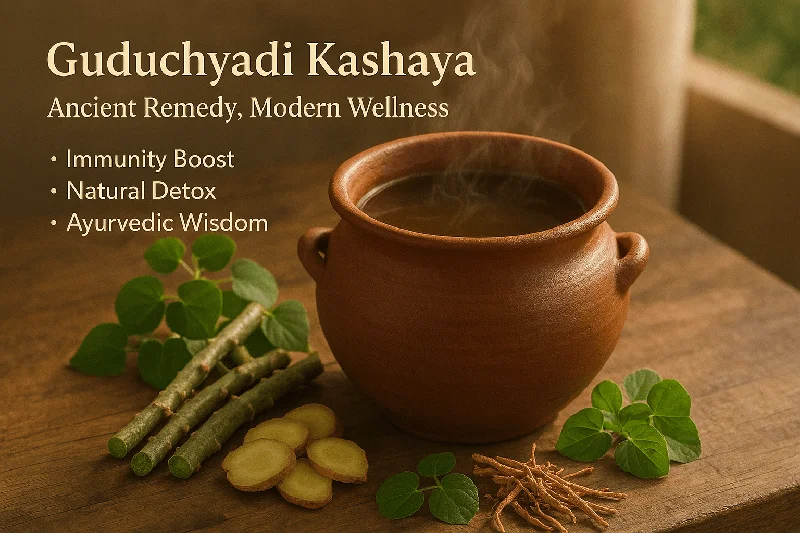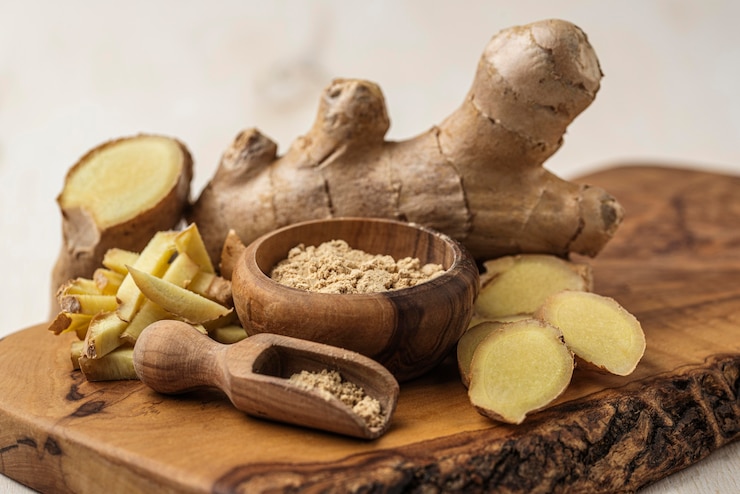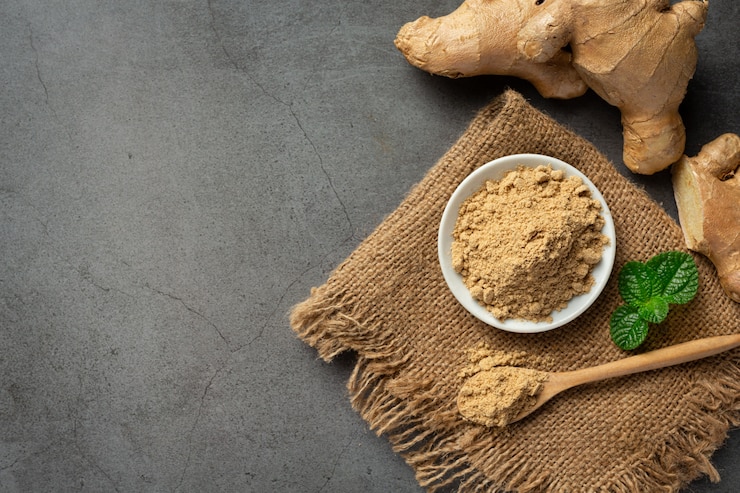Ask Ayurvedic doctor a question and get a consultation online on the problem of your concern in a free or paid mode. More than 2,000 experienced doctors work and wait for your questions on our site and help users to solve their health problems every day.
Guduchyadi Kashaya: Benefits, Research, and Expert Insights

Introduction
Imagine a time-honored Ayurvedic remedy so versatile that it has been used for generations to support overall health, bolster the immune system, and promote a balanced lifestyle. Enter Guduchyadi Kashaya, an herbal decoction widely recognized in Ayurveda for its potential to address various health concerns. Increasingly, modern science is also paying attention to this traditional preparation, exploring the possibilities of its bioactive compounds. In this article, we will delve deep into the history, composition, clinical evidence, and best practices surrounding Guduchyadi Kashaya. We aim to offer you a clear understanding of how it fits into both ancient Ayurvedic principles and contemporary medical perspectives.
What Is Guduchyadi Kashaya?
In Ayurveda, Kashaya refers to a water-based decoction made by boiling specific herbs according to standardized proportions and cooking times. These preparations are believed to harness the full range of plant phytoconstituents for better absorption and therapeutic efficacy. Guduchyadi Kashaya, in particular, is a formulation that features Guduchi (Tinospora cordifolia) as a primary ingredient, along with other carefully chosen herbs.
-
Guduchi (Tinospora cordifolia) is revered for its adaptogenic and immune-modulatory properties.
-
The suffix “–adi” indicates that other components are added to Guduchi to form a synergistic blend.
-
“Kashaya” underscores its nature as a decoction, different from powders (churna), pills (vati), or other Ayurvedic forms like ghrita (medicated ghee).
Modern scientific research and anecdotal evidence both hint at Guduchi’s wide-ranging benefits—ranging from anti-inflammatory actions to immune system support. By combining Guduchi with other herbs in a decoction, practitioners aim to optimize therapeutic benefits.
Don't wait or self medicate. Start chat with Doctor NOW
Key Ingredients and Their Properties
While formulations can vary based on traditional lineages and regional practices, the typical recipe for Guduchyadi Kashaya includes the following herbs:
-
Guduchi (Tinospora cordifolia): Often called “Amrita” in Sanskrit, meaning “immortal,” Guduchi is rich in alkaloids, glycosides, and steroids with potential immunomodulatory and hepatoprotective effects.
-
Other Complementary Herbs (the exact combination can differ):
-
Dry Ginger (Zingiber officinale): May help with digestion and exhibit anti-inflammatory properties.
-
Punarnava (Boerhavia diffusa): Traditionally used for kidney and liver health.
-
Mustaka (Cyperus rotundus): Often cited for its digestive and carminative benefits.
-
Kutki (Picrorhiza kurroa): Known for liver-supporting and detoxifying features.
-
These herbs are typically co-boiled to make a concentrated liquid that captures each plant’s active molecules.
How Guduchyadi Kashaya Works: An Ayurvedic Perspective
According to Ayurvedic principles, Guduchyadi Kashaya works by balancing the three doshas—Vata, Pitta, and Kapha. The synergy of bitter, pungent, and astringent tastes found in the included herbs is thought to reduce excess Pitta and Kapha, which Ayurveda correlates with inflammation and metabolic imbalance, respectively.
-
Digestive Agni (Metabolic Fire): Spices like ginger stimulate the digestive fire (agni), promoting efficient nutrient absorption.
-
Immune Strength (Ojas): Guduchi is often credited for improving Ojas (vital energy), thereby fortifying the immune system.
-
Detoxification (Ama Clearance): By aiding in liver and kidney function, it helps the body’s natural detox pathways.
While these concepts are unique to Ayurveda, they align with certain modern interpretations of inflammation reduction, improved metabolic processes, and enhanced immune modulation.
Scientific Evidence and Current Research
Immunomodulatory and Anti-inflammatory Properties
A systematic review published in the Journal of Ethnopharmacology (2019) highlighted Tinospora cordifolia’s potential to modulate immune response and reduce inflammation. Several in vitro and animal studies suggest that the polysaccharides and alkaloids in Guduchi can influence cytokine levels and immune cells.
Hepatoprotective Effects
Clinical observations and smaller-scale human studies point toward Guduchi’s supportive role in liver function. Researchers in a 2020 study in the Journal of Ayurveda and Integrative Medicine found that using Guduchi-based formulations correlated with improvements in liver enzymes, indicating a restorative effect.
Role in Metabolic Conditions
Some pilot studies have explored the impact of Guduchi on blood sugar regulation, with initial findings pointing to improved insulin sensitivity in certain patient groups. These studies often recommend further large-scale, randomized controlled trials to confirm efficacy and explore potential side effects.
Complementary to Conventional Therapies
While Guduchyadi Kashaya should not replace modern treatments, there is a growing body of research suggesting it can complement conventional interventions. For instance, some healthcare providers incorporate Guduchi-based therapies as adjunct support in managing chronic inflammatory conditions.
Disclaimer: These findings are preliminary and do not constitute clinical guidelines. Always consult a qualified healthcare provider before adding new herbal formulations to your routine.
Therapeutic Uses in Healthcare
Guduchyadi Kashaya is traditionally indicated for:
-
Immune Support: Used to reinforce resilience against common infections.
-
Joint and Muscle Wellness: Believed to reduce inflammation and discomfort.
-
Digestive Health: Often used for bloating or indigestion, thanks to ginger and other carminative ingredients.
-
Liver and Kidney Care: Tinospora cordifolia and Punarnava may promote healthy liver enzyme levels and fluid regulation.
-
Skin Health: Ayurvedic practitioners sometimes recommend it for skin-related issues due to its “cooling” and detoxifying nature.
Modern medical professionals may see potential in these areas, but robust, peer-reviewed clinical trials are still needed to formulate standardized recommendations.
Expert Guidelines and Safety Precautions
-
Dosage Recommendations
-
Dosage can vary based on age, general health condition, and the severity of the issue. Traditional Ayurvedic texts often suggest taking 15–30 ml of Guduchyadi Kashaya twice daily, diluted with warm water.
-
Professional Supervision: Working with a certified Ayurvedic practitioner ensures you receive personalized advice.
-
-
Potential Side Effects
-
Guduchi is generally considered safe, but high doses or prolonged use without guidance may cause digestive discomfort.
-
Always monitor for allergies. Discontinue if you experience itching, rash, or gastrointestinal disturbances.
-
-
Interactions with Medications
-
Consult your healthcare provider if you are on medication for diabetes, hypertension, or immunosuppression, as certain herbs can interact with pharmaceutical drugs.
-
Be vigilant about potential herb-drug interactions, especially if you have a chronic condition.
-
-
Pregnancy and Lactation
-
Pregnant or breastfeeding women should consult an obstetrician or a qualified Ayurvedic expert before initiating Guduchyadi Kashaya to ensure safety.
-
-
Medical Disclaimer
-
The information provided here is for educational purposes. It does not replace professional medical advice, diagnosis, or treatment. Seek a licensed healthcare provider for individualized guidance.
-
How to Prepare Guduchyadi Kashaya at Home (Step-by-Step)
If you prefer to prepare it yourself, here is a general step-by-step guideline:
-
Gather Ingredients
-
Dried Guduchi stem (tinospora)
-
Supporting herbs (e.g., dry ginger, Punarnava, Mustaka)
-
Clean, potable water
-
-
Proportion
-
Typically, 1 part dried herb mixture to 8 parts water. Some variations exist, so consult your Ayurvedic practitioner or follow a reputable formula.
-
-
Boiling Process
-
Combine the herbs with water in a deep pan.
-
Bring to a rolling boil, then reduce to a simmer.
-
Continue simmering until the liquid volume reduces by half.
-
-
Straining
-
Filter out the plant materials using a clean muslin cloth or fine strainer.
-
Store the decoction in a glass container.
-
-
Usage
-
Drink when warm and fresh. If making in bulk, refrigerate and consume within 24 hours. Warm before use.
-
Pro Tip: Ayurvedic texts often suggest consuming decoctions on an empty stomach for optimal absorption. However, modern practitioners may recommend taking it post-meal if you experience gastric sensitivities.
Frequently Asked Questions (FAQ)
1. Can Guduchyadi Kashaya help with seasonal allergies?
Some Ayurvedic practitioners recommend Guduchyadi Kashaya during pollen-heavy seasons due to its immune-supportive properties. While there is anecdotal evidence for its potential benefits, more rigorous scientific data is required.
2. Is Guduchyadi Kashaya safe for children?
Ayurvedic experts sometimes adapt dosages for children, but it must be done under professional guidance. Consult a pediatrician or an Ayurvedic physician specialized in pediatric care.
3. How does Guduchyadi Kashaya differ from Guduchi tablets or capsules?
Guduchyadi Kashaya is a decoction that often includes additional herbs besides Guduchi. Tablets or capsules may contain isolated extracts, sometimes lacking the synergistic effects that come from a multi-herb blend and water-based preparation.
4. Is there scientific proof that Guduchyadi Kashaya works?
Existing studies on Tinospora cordifolia show immunomodulatory and anti-inflammatory benefits, but large-scale human clinical trials on Guduchyadi Kashaya specifically are still limited. Ongoing research is promising, yet not conclusive.
5. Where can I buy high-quality Guduchyadi Kashaya?
Look for GMP-certified Ayurvedic pharmacies or consult an Ayurvedic professional who can guide you toward reputable brands. When purchasing, check for clear labeling, expiration dates, and authenticity certifications.
Conclusion and Call to Action
Guduchyadi Kashaya stands out as a fascinating convergence of Ayurvedic wisdom and modern research. This herbal decoction, anchored by the potent Guduchi plant, may offer benefits ranging from immune modulation and digestive support to potential liver and kidney health. While scientific investigations are still ongoing, preliminary data provides a compelling rationale for its use as a complementary approach, rather than a substitute for conventional medicine.
Ready to explore how Guduchyadi Kashaya could fit into your wellness journey? Always start with professional advice: consult your doctor or a qualified Ayurvedic expert to tailor recommendations to your individual needs.
As you continue your quest for holistic health solutions, feel free to share this article with friends, family, or colleagues who might benefit from learning about Guduchyadi Kashaya. For further questions or personalized advice, visit AskAyurveda.com and ask a free question to expert doctors who can guide you through evidence-based Ayurvedic practices.
Take the next step toward informed self-care—empower yourself with knowledge, consult the right experts, and discover the potential of Guduchyadi Kashaya for balanced well-being.
Disclaimer: The information provided in this article is for educational purposes only and does not replace professional medical advice. Always consult your healthcare provider for personalized recommendations.



